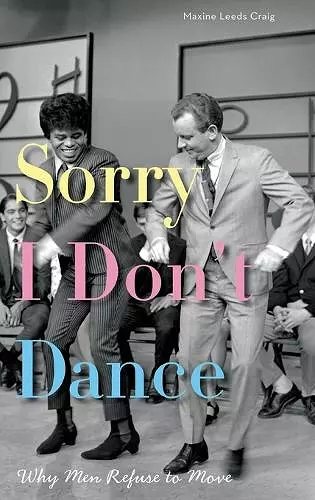Sorry I Don't Dance
Why Men Refuse to Move
Format:Hardback
Publisher:Oxford University Press Inc
Published:5th Dec '13
Currently unavailable, and unfortunately no date known when it will be back
This hardback is available in another edition too:
- Paperback£38.49was £38.49(9780199845293)

That men don't dance is a common stereotype. As one man tried to explain, "Music is something that goes on inside my head, and is sort of divorced from, to a large extent, the rest of my body." How did this man's head become divorced from his body? While it may seem natural and obvious that most white men don't dance, it is actually a recent phenomenon tied to the changing norms of gender, race, class, and sexuality. Combining archival sources, interviews, and participant observation, Sorry I Don't Dance analyzes how, within the United States, recreational dance became associated with women rather than men, youths rather than adults, and ethnic minorities rather than whites. At the beginning of the twentieth century and World War II, lots of ordinary men danced. In fact, during the first two decades of the twentieth century dance was so enormously popular that journalists reported that young people had gone "dance mad" and reformers campaigned against its moral dangers. During World War II dance was an activity associated with wholesome masculinity, and the USO organized dances and supplied dance partners to servicemen. Later, men in the Swing Era danced, but many of their sons and grandsons do not. Turning her attention to these contemporary wallflowers, Maxine Craig talks to men about how they learn to dance or avoid learning to dance within a culture that celebrates masculinity as white and physically constrained and associates both femininity and ethnically-marked men with sensuality and physical expressivity. In this way, race and gender get into bodies and become the visible, common sense proof of racial and gender difference.
Yes! Real men dance-which comes as quite a relief to this man who spent hundreds of hours in front of a mirror mastering the dance steps to the Temptations' 'My Girl.' And they always have danced-from mining camps to tea lounges, army bases to discos. Combining deft historical excavation and discerning interviews, Maxine Craig shows men hogtied by an ideology of masculinity that leaves them barely able to sway against the wall. Her book will help them heed the urgings of so many singers, from Sly Stone to David Bowie. Let's dance. * Michael Kimmel, Distinguished Professor of Sociology and Gender Studies, SUNY Stony Brook *
Rich with insight, Sorry I Don't Dance maps the ever-shifting field of dance and movement, its entanglements with race, sex and sexuality, social class, the meaning of American patriotism, and morality. Craig draws together a range of materials that permit both historical analysis of masculine dance practice and a fine-tuned analysis of the everyday landscape of contemporary men and masculine embodiment. A sensitive investigation of a complicated topic. * Amy Best, author of Prom Night *
For anyone who has tried to get a man to dance, Maxine Craig shows how a man's refusal or acceptance has little to do with his would-be partner and much to do with how he was raised, in what communities and time period, and whether he experiences dance as threatening or enhancing his masculinity. Craig weaves together sophisticated analyses of the race, class, gender and sexual dimensions of embodied performance with evocative and eye-opening stories and interviews. * Miliann Kang, author of The Managed Hand *
Maxine Leeds Craig has written an important book for anyone who wants to understand masculinity. For me, who loves to dance, teaches dance to physical education students at university, and researches dance and learning in schools, Sorry I Don't Dance. Why Men Refuse to Dance provides important insights. * Torun Mattsson, idrottsforum *
ISBN: 9780199845279
Dimensions: 160mm x 236mm x 20mm
Weight: 562g
240 pages